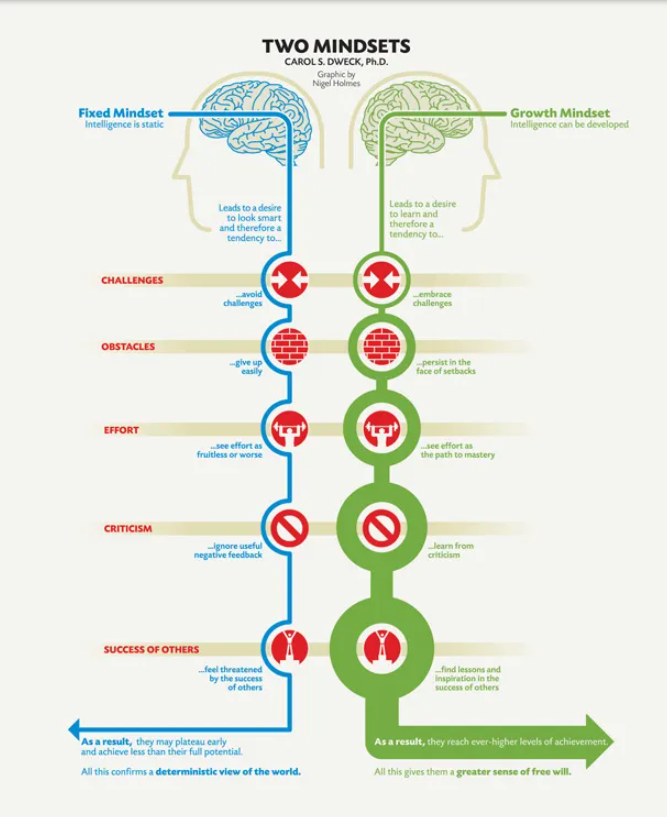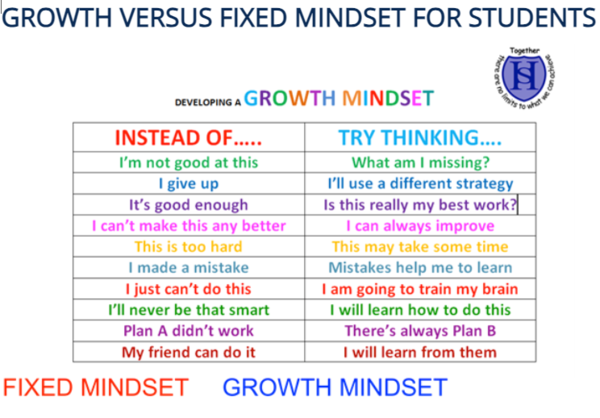Growth Mindset Vs. A Fixed Mindset
 From Conservapedia
From Conservapedia According to Central Western University: " A growth mindset is how much you believe your basic qualities, like intelligence and talent, can be changed or developed. A fixed mindset is how much you believe your basic qualities are fixed or permanent."[4]
Harvard Business School contrast a growth mindset vs. a fixed mindset thusly:
| “ | [According to Dweck], challenging situations can be catastrophic for those with fixed mindsets because of the implication that if they don’t already have the skills or intelligence to complete a task, there’s no chance of improvement.
When you have a growth mindset, you believe you can gain the knowledge and skills necessary to succeed, which makes every challenge a learning opportunity. Given the numerous challenges entrepreneurs face, a growth mindset can be a powerful tool as you work toward your venture’s success.[5] |
” |
The Harvard Business School points out that a growth mindset helps entrepreneurs enter new fields easier and it develops resilience because "When challenges, setbacks, and failures inevitably arise, your business’s survival depends on your ability to persevere and learn from difficult situations."[6]
Contents
Behaviors, beliefs, thoughts and accrued benefits of those with a growth mindset[edit]
Those who adopt a growth mindset are more likely to:[7][8]
- Practice lifelong learning and are therefore more likely to have higher confidence, higher self-esteem, a higher sense of accomplishment and improved memory and cognitive function.[9]
- Believe intelligence is not static and is subject to improvement
- Have more grit and therefore expend more effort in order to learn
- Put in the effort that leads to mastery of a topic or skill
- Embrace a trial and error method of learning and therefore view errors a merely temporary setbacks
- See errors as useful feedback that is a source of information (Thomas Edison learned many ways how not to create a lightbulb on his way to creating a lightbulb)
- Eagerly embraces challenges
- Have higher self-esteem and confidence and lower rates of depression
- Have higher self-awareness which comes from going beyond one's comfort zone and changing one's life situation. See: Change management
- Sees others' success and accomplishments as a source of inspiration rather than something to be envious about
- Views feedback from others as an opportunity to learn rather than something to be angry about or as something catastrophic
- Have a more positive/constructive attitude
- Better able to attract people who are achievers or that have different viewpoints that can challenge them. See: Social influence
- Have more mental toughness and psychological resilience
- In fields or businesses that are new areas or where formal education is not available, individuals have more acumen.
- Managers or business owners who have a growth mindset are able to add this to the organizational culture
Behaviors, beliefs, thoughts and accrued costs of those with a fixed mindset[edit]

Those with a fixed mindset:[11][12]
- Believes intelligence and talent are unchangeable.
- Less likely to engage in lifelong learning
- Avoid challenges in order to try to avoid failure. But success often comes to those who are like hockey players who have many shots on goal.
- Disregards useful feedback from others
- Has a greater propensity to be envious and resentful by the success of others
- Hides flaws rather than consulting with others so as not to be judged by others
- Believes putting in effort is pointless so therefore worthless
- Views feedback as personal criticism
- Lacks persistence and gives up far too easily. In dire or adverse situations, this can be dangerous.
- Less likely to take profitable and important calculated risk and have less of a sense of adventure. See: Risk and Risk management
- Have lower confidence and lower self-esteem.
- Lower self-awareness
- Are more likely to have a negative attitude
- Individuals with a fixed mindset rather than a growth mindset are more likely to be envious of the success and accomplishments of others.[13]
Graphical comparisons of a growth mindset vs. a fixed mindset[edit]
External links[edit]
- A Growth mindset vs. a Fixed Mindset: What's the Difference, Harvard Business Review
Videos:
- Growth mindset vs. a fixed mindset - Video playlist
References[edit]
- ↑ The Human Body: God's Masterpiece
- ↑ The Enigmatic Human Brain by Wallace G. Smith
- ↑ The Most Complex Structure, Creation Moments
- ↑ Growth mindset vs. a fixed mindset
- ↑ GROWTH MINDSET VS. FIXED MINDSET: WHAT'S THE DIFFERENCE?, Harvard Business School
- ↑ GROWTH MINDSET VS. FIXED MINDSET: WHAT'S THE DIFFERENCE?, Harvard Business School
- ↑ Growth Mindset vs Fixed Mindset: How what you think affects what you achieve
- ↑ Growth vs. Fixed Mindset: Nine Benefits and How To Develop One
- ↑ The Power Of Lifelong Learning: How Curiosity Forges Mastery, Forbes
- ↑ Growth Mindset vs Fixed Mindset: How what you think affects what you achieve
- ↑ Growth Mindset vs Fixed Mindset: How what you think affects what you achieve
- ↑ 5 dangers of having a fixed mindset
- ↑ Growth Mindset vs Fixed Mindset: How what you think affects what you achieve
Categories: [Psychology] [Personal development]
↧ Download as ZWI file | Last modified: 02/17/2024 16:01:55 | 40 views
☰ Source: https://www.conservapedia.com/Growth_mindset_vs._a_fixed_mindset | License: CC BY-SA 3.0




 KSF
KSF